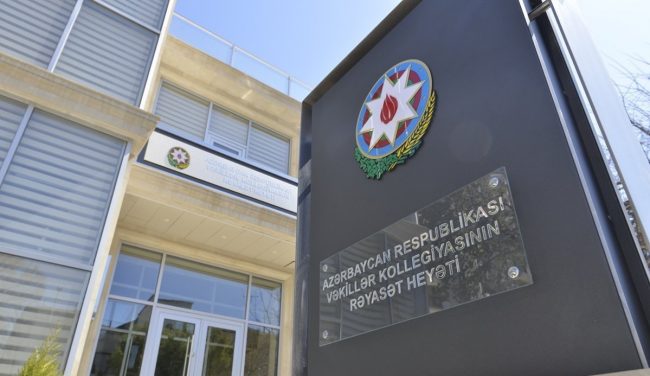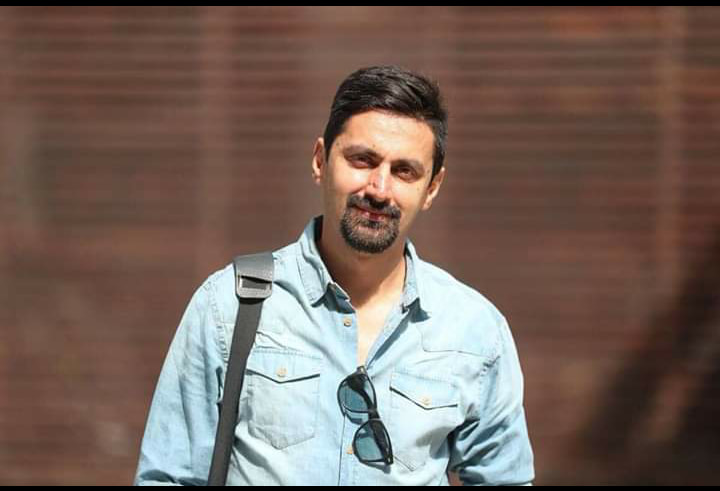
 Changes to the leadership and rules surrounding Azerbaijan’s Bar Association have left a number of prominent human rights lawyers unable to practice their trade. Independent journalists and opposition politicians say they are being left defenceless against political prosecutions, with one prominent human rights defender claiming just six lawyers now represent 150 political prisoners.
Changes to the leadership and rules surrounding Azerbaijan’s Bar Association have left a number of prominent human rights lawyers unable to practice their trade. Independent journalists and opposition politicians say they are being left defenceless against political prosecutions, with one prominent human rights defender claiming just six lawyers now represent 150 political prisoners.
Freelance journalist Aynur Elgunash sued Azerbaijan’s Bar Association after they expelled her lawyer, Yalchin Imanov. Elgunash was repeatedly summoned for questioning as part of an investigation into journalists from Meydan TV, and she was eventually handed a travel ban. Before being disbarred, Imanov defended her both in interviews with police and in the courts. Now, the journalist has been left without a lawyer.
‘I need my lawyer’, Elgunash told OC Media, ‘in protest against the removal of my lawyer from the Bar Association, I appealed to Baku Administrative Economic Court No 1, but my complaint was dismissed’. The case is now being heard in the Court of Appeals.
Elgunash said the Bar Association offered her another lawyer. ‘I didn’t want that’, she said, ‘because I don’t trust any other lawyers. In today’s situation, the number of attorneys in the political process is minimal’.
According to Elgunash, the vast majority of lawyers are afraid to properly represent clients in political cases, so they take part as brokers only.
‘I'm against it. I can only trust people who won’t lead me in the wrong direction’, Elgunash said.
In past years, politically motivated disbarment was a relatively rare occurrence. With notable exceptions such as rights lawyers Aslan Ismayilov, Khalid Bagirov, Elchin Namazov, and Muzaffar Bakhish, all expelled from practising law.
In recent months, however, the crackdown has intensified, with a number of lawyers defending political activists and journalists facing disciplinary action by the Bar Association.
Imanov, whose clients have also included renowned investigative journalist Khadija Ismayilova among others, was disbarred in November 2017. Irada Javadova, who criticised the association for disbarring Yalchin Imanov was disbarred in June. Fakhraddin Mehdiyev, Asabali Mustafayev, and Nemat Karimli, who all defended prominent journalists and opposition figures were given year-long suspensions.
Next they came for the lawyers
Imanov, who has defended many political activists, political prisoners, and journalists as well as Elgunash, told OC Media that the removal of lawyers from political advocacy is a logical consequence of the government’s policy over the past few years.
‘Since political organisations were squeezed out, independent NGOs were restricted, some heads of NGOs were arrested, and independent media was blocked — independent lawyers were next in line’, he said.
Imanov said the process became intensive after the leadership of the Bar Association changed in Autumn 2017.
‘First, I was disbarred. Then other attorneys’ activities were suspended. Later, lawyers from the Group of Practising Lawyers [an independent group of lawyers] were not allowed to represent themselves in the Association’, said Imanov.
Imanov said the government was trying to eliminate the availability of a high-quality legal defence for political prisoners by destroying independent advocacy institutions.
This, he said, has several objectives, including blocking access to information through such independent lawyers. ‘Lawyers conveyed information on torture and legal violations to the public’, he said, the end goal being ‘to achieve a dutiful, […] advocacy institute’.
According to Imanov, the Bar Association’s new charter, which was adopted on 17 December and allows the Bar to initiate disciplinary proceedings against lawyers, has been used to silence independent voices.
‘Following this provision, the criticisms of advocates in the media about the judicial process, and criticism of government officials, may come at a cost of their careers.’
‘Agents’
In this year’s review of candidates for the Bar, none of those actively involved in political or civic activism passed the interview phase in March. Samad Rahimli, a member of the Group of Practising Lawyers, told OC Media that the motives for his and other activists’ rejections was political.
‘It’s unreasonable that all members of a certain group were prevented from passing [the interview]. Not just the Group of Practising Lawyers, but all other public or civic activists, in all forms, couldn’t pass’, Rahimli said.
Rahimli said the Bar exhibited bias against him and other activists during the interview.
‘Our answers were essentially unacceptable, even when we answered the questions correctly. Members of the speciality commission were harsh towards us. Before the qualifying exam, the Association’s leadership made a statement that some of us sought to destroy the Association, that people like us should not be allowed [to join]. After the interview, the Chairman of the Bar Association called us “PIN agents” [agents of Czech humanitarian NGO People in Need]. The Association was clearly biased against us’, said Rahimli.
He said that some of the lawyers involved in political activities were now petitioning the Bar Association to allow them in.
‘Lawyer Ramil Suleymanov gave a written pledge “not to engage in political activities”. It’s clear that the board of the Association is engaged in cutting off public and political activists due to the “political factor” ’.
Rahimli said the Bar Association was dependent on governmental organisations and the Ministry of Justice.
Carrot and stick policy
Human rights defender Intigam Aliyev, head of the Legal Enlightenment Society, told OC Media that authoritarian governments are not interested in fostering robust advocacy, arguing that a strong and independent lawyer is the biggest obstacle to arbitrariness, lawlessness, and corruption in the judicial and law enforcement bodies. Aliyev has brought several cases against Azerbaijan to the European Court of Human Rights.
‘The Azerbaijani authorities also understand that the current massive human rights violations would not be possible in a strong and independent jurisdiction; bribery and corruption in the courts would not be at their current level; lawlessness and arbitrariness in the country would not endanger its current frontiers. In other words, the government has always viewed advocacy as a strategic area of political interest,’ said Aliyev.
He added that lawyers have always been under attack in the country. According to him, the pressure on independent lawyers increased at the same time international pressure on the Azerbaijani government intensified, particularly over the criminal cases against independent NGOs and international organisations and the repression and arrests of well-known civil society activists that began in 2014.
‘At that time, lawyers played a crucial role in bringing these violations to the national and global public. Therefore, the government began to pursue a policy in two directions to further strengthen control over advocacy: Independent lawyers began to be removed from the Bar Association; some were prosecuted, some were arrested, bank accounts were suspended, others’ activity was suspended for a while, and so on. The Bar Association was also given a new building, and material and technical support were strengthened: in the one hand a carrot, in the other a stick’.
Aliyev was himself arrested in August 2014, spending almost two years behind bars on what rights groups like Amnesty International called ‘trumped up charges’.
In recent years, according to Aliyev, only 10–15 lawyers were involved in the numerous administrative, civil, and criminal cases regarding political repression of civil society in the country. According to him, these lawyers became a severe headache for the government, driving it’s efforts to dismiss them.
‘At present, six lawyers in the Bar Association are involved in political cases. There are more than 150 political prisoners in the country. This demonstrates how critical the situation is.’
‘Discrediting the Bar’
The Chairman of the Bar Association, Anar Bagirov, has been vocal in defending the Bar against such accusations.
‘I am confident that the Bar Association is independent and will continue its independent activities’, Bagirov told the BBC in December. ‘Populist people who have been expelled from the Bar for these and other offences are trying to discredit the lawyer’s institution’, he said.
Bagirov has also denied that there was a problem with admissions to the Bar Association.
‘There is a procedure for admission to the Bar Association’, he told Qafqazinfo, ‘and anyone who wishes may apply within this framework. We will not allow the Association in Azerbaijan to become an instrument in the hands of any dark force. Opening a political discourse around these issues is inappropriate. Those who are punished for formal violations are politicising this’, he said.
Bagirov also dismissed accusations by opposition lawmakers regarding problems in the Bar’s admission exams. ‘Among those who fail the exams are civil servants and members of the [ruling] New Azerbaijan Party. We do not control any party affiliation’ he said.




 30 August 2018
30 August 2018




